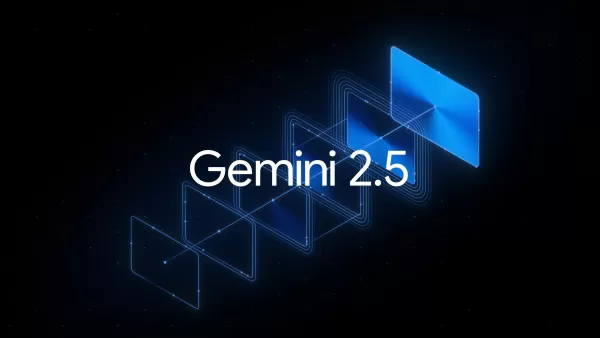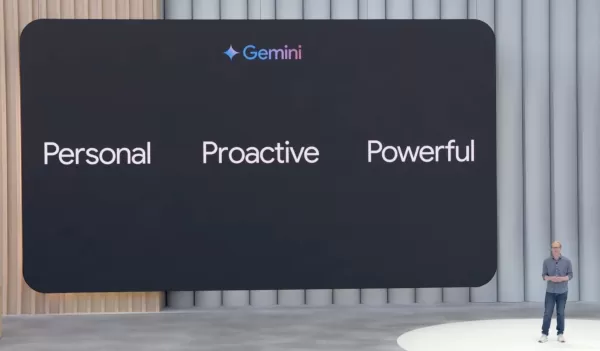Google Unveils Efficient Gemini AI Model

Google is set to unveil a new AI model, Gemini 2.5 Flash, which promises robust performance while prioritizing efficiency. This model will be integrated into Vertex AI, Google's platform for AI development. According to Google, Gemini 2.5 Flash offers "dynamic and controllable" computing capabilities, enabling developers to tweak processing times according to the complexity of their queries.
In a blog post shared with TechCrunch, Google stated, "You can tune the speed, accuracy, and cost balance for your specific needs. This flexibility is key to optimizing Flash performance in high-volume, cost-sensitive applications." This approach comes at a time when the costs associated with top-tier AI models are on the rise. Models like Gemini 2.5 Flash, which are more budget-friendly while still delivering solid performance, serve as an appealing alternative to pricier options, albeit with a slight trade-off in accuracy.
Gemini 2.5 Flash is categorized as a "reasoning" model, similar to OpenAI's o3-mini and DeepSeek's R1. These models take a bit more time to respond as they fact-check their answers, ensuring reliability. Google highlights that 2.5 Flash is particularly suited for "high-volume" and "real-time" applications, such as customer service and document parsing.
Google describes 2.5 Flash as a "workhorse model" in their blog post, stating, "It’s optimized specifically for low latency and reduced cost. It’s the ideal engine for responsive virtual assistants and real-time summarization tools where efficiency at scale is key." However, Google did not release a safety or technical report for this model, which makes it harder to pinpoint its strengths and weaknesses. The company had previously mentioned to TechCrunch that it does not issue reports for models it deems "experimental."
On Wednesday, Google also revealed plans to extend Gemini models, including 2.5 Flash, to on-premises environments starting in the third quarter. These models will be available on Google Distributed Cloud (GDC), Google’s on-prem solution designed for clients with stringent data governance needs. Google is collaborating with Nvidia to make Gemini models compatible with GDC-compliant Nvidia Blackwell systems, which customers can buy directly from Google or through other preferred channels.
Related article
 Google Relaunches AI-Powered 'Ask Photos' with Improved Speed Features
Following a temporary halt in testing, Google is relaunching its AI-driven "Ask Photos" search functionality in Google Photos with significant enhancements. Powered by Google's Gemini AI technology, this innovative feature helps users locate specific
Google Relaunches AI-Powered 'Ask Photos' with Improved Speed Features
Following a temporary halt in testing, Google is relaunching its AI-driven "Ask Photos" search functionality in Google Photos with significant enhancements. Powered by Google's Gemini AI technology, this innovative feature helps users locate specific
 Google AI Ultra Unveiled: Premium Subscription Priced at $249.99 Monthly
Google Unveils Premium AI Ultra SubscriptionAt Google I/O 2025, the tech giant announced its new comprehensive AI subscription service - Google AI Ultra. Priced at $249.99 monthly, this premium offering provides exclusive access to Google's most adva
Google AI Ultra Unveiled: Premium Subscription Priced at $249.99 Monthly
Google Unveils Premium AI Ultra SubscriptionAt Google I/O 2025, the tech giant announced its new comprehensive AI subscription service - Google AI Ultra. Priced at $249.99 monthly, this premium offering provides exclusive access to Google's most adva
 Microsoft Study Finds More AI Tokens Increase Reasoning Errors
Emerging Insights Into LLM Reasoning EfficiencyNew research from Microsoft demonstrates that advanced reasoning techniques in large language models don't produce uniform improvements across different AI systems. Their groundbreaking study analyzed ho
Comments (2)
0/200
Microsoft Study Finds More AI Tokens Increase Reasoning Errors
Emerging Insights Into LLM Reasoning EfficiencyNew research from Microsoft demonstrates that advanced reasoning techniques in large language models don't produce uniform improvements across different AI systems. Their groundbreaking study analyzed ho
Comments (2)
0/200
![AnthonyMiller]() AnthonyMiller
AnthonyMiller
 August 20, 2025 at 7:01:21 PM EDT
August 20, 2025 at 7:01:21 PM EDT
Google's Gemini 2.5 Flash sounds like a game-changer for efficient AI! Excited to see how it stacks up against other models in real-world apps. 🚀


 0
0
![ChristopherThomas]() ChristopherThomas
ChristopherThomas
 August 14, 2025 at 2:01:07 PM EDT
August 14, 2025 at 2:01:07 PM EDT
Google's Gemini 2.5 Flash sounds like a game-changer for efficient AI! I'm curious how its 'dynamic' computing stacks up against others. Anyone tried it on Vertex AI yet? 🤔


 0
0

Google is set to unveil a new AI model, Gemini 2.5 Flash, which promises robust performance while prioritizing efficiency. This model will be integrated into Vertex AI, Google's platform for AI development. According to Google, Gemini 2.5 Flash offers "dynamic and controllable" computing capabilities, enabling developers to tweak processing times according to the complexity of their queries.
In a blog post shared with TechCrunch, Google stated, "You can tune the speed, accuracy, and cost balance for your specific needs. This flexibility is key to optimizing Flash performance in high-volume, cost-sensitive applications." This approach comes at a time when the costs associated with top-tier AI models are on the rise. Models like Gemini 2.5 Flash, which are more budget-friendly while still delivering solid performance, serve as an appealing alternative to pricier options, albeit with a slight trade-off in accuracy.
Gemini 2.5 Flash is categorized as a "reasoning" model, similar to OpenAI's o3-mini and DeepSeek's R1. These models take a bit more time to respond as they fact-check their answers, ensuring reliability. Google highlights that 2.5 Flash is particularly suited for "high-volume" and "real-time" applications, such as customer service and document parsing.
Google describes 2.5 Flash as a "workhorse model" in their blog post, stating, "It’s optimized specifically for low latency and reduced cost. It’s the ideal engine for responsive virtual assistants and real-time summarization tools where efficiency at scale is key." However, Google did not release a safety or technical report for this model, which makes it harder to pinpoint its strengths and weaknesses. The company had previously mentioned to TechCrunch that it does not issue reports for models it deems "experimental."
On Wednesday, Google also revealed plans to extend Gemini models, including 2.5 Flash, to on-premises environments starting in the third quarter. These models will be available on Google Distributed Cloud (GDC), Google’s on-prem solution designed for clients with stringent data governance needs. Google is collaborating with Nvidia to make Gemini models compatible with GDC-compliant Nvidia Blackwell systems, which customers can buy directly from Google or through other preferred channels.
 Google Relaunches AI-Powered 'Ask Photos' with Improved Speed Features
Following a temporary halt in testing, Google is relaunching its AI-driven "Ask Photos" search functionality in Google Photos with significant enhancements. Powered by Google's Gemini AI technology, this innovative feature helps users locate specific
Google Relaunches AI-Powered 'Ask Photos' with Improved Speed Features
Following a temporary halt in testing, Google is relaunching its AI-driven "Ask Photos" search functionality in Google Photos with significant enhancements. Powered by Google's Gemini AI technology, this innovative feature helps users locate specific
 Google AI Ultra Unveiled: Premium Subscription Priced at $249.99 Monthly
Google Unveils Premium AI Ultra SubscriptionAt Google I/O 2025, the tech giant announced its new comprehensive AI subscription service - Google AI Ultra. Priced at $249.99 monthly, this premium offering provides exclusive access to Google's most adva
Google AI Ultra Unveiled: Premium Subscription Priced at $249.99 Monthly
Google Unveils Premium AI Ultra SubscriptionAt Google I/O 2025, the tech giant announced its new comprehensive AI subscription service - Google AI Ultra. Priced at $249.99 monthly, this premium offering provides exclusive access to Google's most adva
 Microsoft Study Finds More AI Tokens Increase Reasoning Errors
Emerging Insights Into LLM Reasoning EfficiencyNew research from Microsoft demonstrates that advanced reasoning techniques in large language models don't produce uniform improvements across different AI systems. Their groundbreaking study analyzed ho
Microsoft Study Finds More AI Tokens Increase Reasoning Errors
Emerging Insights Into LLM Reasoning EfficiencyNew research from Microsoft demonstrates that advanced reasoning techniques in large language models don't produce uniform improvements across different AI systems. Their groundbreaking study analyzed ho
 August 20, 2025 at 7:01:21 PM EDT
August 20, 2025 at 7:01:21 PM EDT
Google's Gemini 2.5 Flash sounds like a game-changer for efficient AI! Excited to see how it stacks up against other models in real-world apps. 🚀


 0
0
 August 14, 2025 at 2:01:07 PM EDT
August 14, 2025 at 2:01:07 PM EDT
Google's Gemini 2.5 Flash sounds like a game-changer for efficient AI! I'm curious how its 'dynamic' computing stacks up against others. Anyone tried it on Vertex AI yet? 🤔


 0
0





























